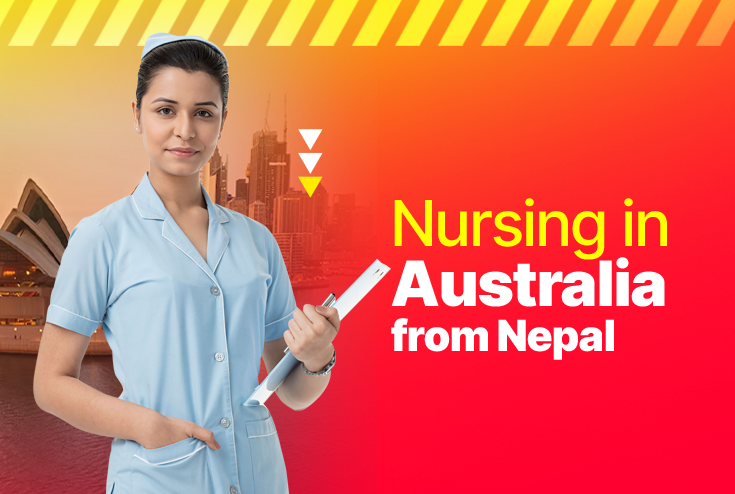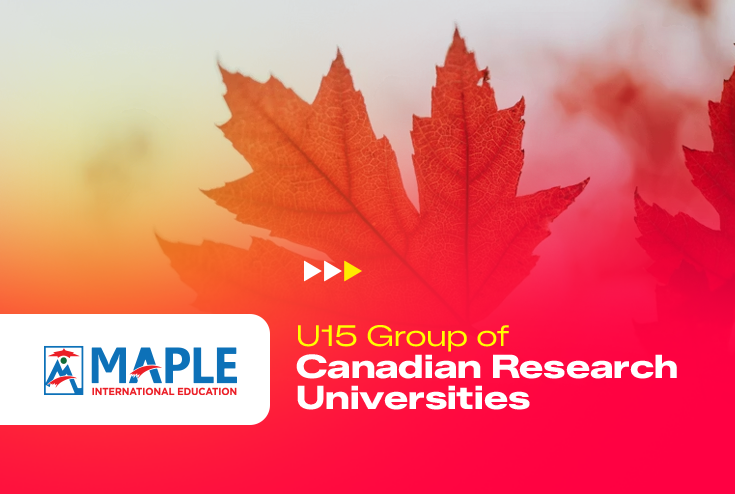
Nursing in Australia from Nepal: Everything You Need to Know
Are you dreaming of a rewarding career in healthcare? Studying nursing in Australia from Nepal is one of the best ways to combine academic excellence, international exposure, and strong job prospects. With world-class universities, global recognition, and clear pathways to permanent residency, Australia is a top destination for aspiring Nepali nursing students.
In this comprehensive guide, we’ll explore everything you need to know about studying nursing in Australia from Nepal, including available courses, eligibility requirements, tuition fees, scholarships, post-study opportunities, and pathways to permanent residency (PR).
Table of Contents
Why Study Nursing in Australia from Nepal?
Popular Nursing Courses in Australia for Nepali Students
Eligibility Requirements to Study Nursing in Australia
Academic Requirements
English Language Requirements
Documents Checklist to Apply for Nursing Degree in Australia from Nepal
Cost to Study Nursing in Australia from Nepal
Tuition Fees
Other Essential Costs
Scholarship Opportunities for Nursing Degree in Australia
Vice-Chancellor’s International Scholarships
University-Specific Nursing Scholarships
Research Training Program (RTP) Scholarships
How to Apply for Nursing in Australia from Nepal?
Post-Study Work Opportunities for Nursing Graduates in Australia
Final Thoughts
FAQs: Nursing in Australia from Nepal
Why Study Nursing in Australia from Nepal?
Australia has emerged as a top destination for Nepali students seeking globally recognized nursing and healthcare education. Below are few reasons why Australia might be an ideal destination for you to pursue Nursing degree:
1. Globally Recognized Nursing Degrees
Australian nursing qualifications are respected and accepted worldwide. Completing your diploma, bachelor's, or master's from Australia makes you eligible for nursing roles across the globe, including the UK, Canada, and the USA.
2. High Demand for Nurses in Australia
Australia is facing a nationwide shortage of nurses. This makes nursing one of the most in-demand professions, ensuring strong job security and excellent employment opportunities for international students.
3. Direct Pathways to Permanent Residency (PR)
Nursing is consistently listed on Australia's Skilled Occupation List. After graduation, students can apply for PR through various skilled migration and employer-sponsored visa programs.
4. Hands-on Clinical Experience
Nursing programs in Australia emphasize practical training in real hospital environments. This experience prepares students to meet international healthcare standards and perform confidently in clinical settings.
5. Scholarships and Support for Nepali Students
Australian universities offer various scholarships and financial aid for deserving Nepali students. These can reduce tuition costs significantly and help ease the financial burden of studying abroad.
6. Multicultural and Student-Friendly Environment
Australia is home to thousands of international students, including many from Nepal. Cities like Sydney, Melbourne, and Adelaide offer safe, welcoming, and inclusive communities for Nepali students.
7. Advanced Healthcare Infrastructure
Australia’s healthcare system is among the best in the world. Learning in this environment gives students exposure to modern medical practices, advanced technologies, and evidence-based care.
Popular Nursing Courses in Australia for Nepali Students
Australia offers a range of nursing programs tailored to students at different academic levels. Whether you're a recent +2 graduate or already hold a nursing degree, there's a suitable course for you.
1. Diploma of Nursing
Level: Vocational (Enrolled Nurse Qualification)
Duration: 18 - 24 Months
Ideal For: +2 Science students who want to start a nursing career quickly
Outcome: Enrolled Nurse (EN) — eligible to work in hospitals or aged care
Key Learning: Basic nursing procedures, patient care, communication, infection control, medication administration
Pathway: Direct employment or further studies (Bachelor of Nursing)
2. Bachelor of Nursing (BSc Nursing)
Level: Undergraduate Degree
Duration: 3 years full-time
Ideal For: +2 Science students with Biology looking for a full nursing career
Outcome: Registered Nurse (RN) with AHPRA registration
Key Learning: Human anatomy, nursing theory, pharmacology, clinical placements, mental health, aged care
Pathway: Direct employment, postgraduate study (Master's), PR application
3. Master of Nursing (MSc Nursing)
Level: Postgraduate (Advanced Nursing)
Duration: 2 years full-time
Ideal For: BSc Nursing graduates or experienced nurses from Nepal
Outcome: Advanced Nurse, Clinical Leader, Specialist Nurse
Key Learning: Leadership, research, nursing management, advanced patient care, specialization (mental health, ICU, aged care)
Pathway: High-salaried roles, teaching, management, or PhD in nursing
4. Graduate Certificate and Graduate Diploma in Nursing
Level: Postgraduate (Short specialization courses)
Duration: 6 months (Certificate) to 1 year (Diploma)
Ideal For: Registered Nurses looking to specialize or upgrade skills
Outcome: Skill enhancement or eligibility for further studies (e.g., Master of Nursing)
Key Learning: Focused knowledge in areas like mental health, infection control, aged care, or pediatric nursing
Pathway: Specialist roles, eligibility to pursue a Master’s degree
Eligibility Requirements to Study Nursing in Australia
To pursue a nursing degree in Australia, international students typically need to demonstrate a strong academic background, particularly in Science and English, and meet specific English language proficiency requirements. Below is a breakdown of the requirements:
Academic Requirements
Strong academic background, particularly in Science and English
Minimum GPA: 3.0 or above (varies by university)
The GPA requirement is less for the diploma levels and higher for the Bachelor and Master degree.
English Language Requirements
IELTS: Overall 7.0, with no band less than 7.0
PTE Academic: Overall 65 with no band less than 65
OET with a minimum score of B or 350 in each of the four components
TOEFL iBT with a minimum total score of 94 and the minimum score 24 for listening and reading, 27 for writing, and 23 for speaking.
Documents Checklist to Apply for Nursing Degree in Australia from Nepal
To apply for a nursing degree in Australia, you will need the following documents:
Academic Documents and Transcripts
Certificate of Registration from Nepal Nursing Council (Optional for Admission)
Valid Passport Copy
Latest CV / Resume
English Proficiency Test Scores
Statement of Purpose
Confirmation of Enrollment (CoE) from an Australian Institute
A mandatory OSHC (health insurance) for the total duration of your stay in Australia
Proof of Finances (Bank Balance, Education Loan)
Source of Income of your sponsors along with the Tax Clearance and Bank Statements (minimum 1 year)
Relationship verification documents with your sponsors
Immigration Medical Examination (can be done before or after visa lodgement)
Police verification certificate stating good character
Cost to Study Nursing in Australia from Nepal
On average, tuition fees for the nursing program range from AUD 20,000 to AUD 50,000 per year, depending on the level of the course - Diploma or Bachelor or Master degree. In addition, international students are required to show evidence of at least AUD 29,710 per year to cover living expenses. This makes the total estimated annual cost between AUD 36,710 to AUD 59,710.
1. Tuition Fees
2. Other Essential Costs
OSHC (Insurance): AUD 500 - 700 per year
Living Cost: AUD 29,710/year (mandatory for visa)
Visa Application Fee: AUD 2,000
For a comprehensive breakdown of all the key expenses - from tuition and visa fees to living costs, please refer to this blog:
Cost to Study in Australia from Nepal in 2025: A Guide
Scholarship Opportunities for Nursing Degree in Australia
Studying nursing in Australia from Nepal can be expensive, but many universities and government bodies offer scholarships to help reduce the financial burden. These scholarships are based on academic merit, financial need, or enrollment in regional campuses.
1. Vice-Chancellor’s International Scholarships
Many Australian universities offer this prestigious scholarship to top international students, including those from Nepal.
Amount: Partial to 100% tuition fee waiver
Eligibility: High academic achievement in +2 or bachelor’s degree
Applicable Universities: University of Sydney, Deakin, La Trobe, UTS, etc.
Level: Mostly Bachelor and Master’s programs
2. University-Specific Nursing Scholarships
Several universities offer nursing-specific scholarships to international students:
Deakin International Scholarship
Value: 25% of tuition fees
Level: Bachelor & Master of Nursing
Eligibility: Strong GPA in previous study and IELTS 7.0+
La Trobe International Scholarship
Value: 15% to 25% tuition fee discount
Level: Bachelor & Postgraduate Nursing
Eligibility: Based on academic merit and early application
Charles Darwin University Global Merit Scholarship
Value: Up to 50% off tuition
Eligibility: High-achieving Nepali students enrolling in nursing courses
These scholarships are highly beneficial for students pursuing BSc Nursing or MSc Nursing in Australia.
3. Research Training Program (RTP) Scholarships
For Nepali students interested in research-based Master’s or PhD in Nursing, the RTP scholarship is a great option.
Covers: Tuition fees, living allowance, and health cover
Eligibility: Academic excellence, research proposal, supervisor approval
Level: Postgraduate research (MPhil/PhD)
This is one of the most generous scholarships funded by the Australian Government.
How to Apply for Nursing in Australia from Nepal?
Applying for a Nursing degree in Australia from Nepal involves multiple steps - from choosing the right university to getting your visa approved. Here’s a complete roadmap to help you navigate the process confidently.
Step 1: Research and Shortlist Institutions
Begin by researching institutions based on Tuition fees, Location (regional or metro), Scholarship availability, and Visa success rate for Nepali students.
Step 2: Check Eligibility Requirements
Ensure you meet the basic GPA, english test scores, and financial criteria of the selected universities / colleges.
Step 3: Gather Required Documents
Compile your necessary documents i.e. passport, academic transcripts and certificates, language proficiency test scores, SOP, financial documents, CV/resume, recommendation letters, work experience letters (if applicable).
Step 4: Apply to Universities
You can apply directly through the university website, through a recognized education consultancy.
Step 5: Receive and Accept Offer Letter
If accepted, you’ll receive:
Conditional Offer Letter (based on pending documents or payments)
Unconditional Offer Letter once all conditions are met
To accept the offer:
Sign the acceptance form
Pay initial tuition deposit (as per the university conditions)
Purchase Overseas Student Health Cover (OSHC) for the full study period
Step 6: Prepare for Visa Application
Apply for the Australian Student Visa (Subclass 500) through the ImmiAccount portal. Make sure to attach every document in the portal as per the documents checklist mentioned previously.
Step 7: Attend Biometric & Medical Examination
You are required to:
Provide biometric information at VFS Global
Attend a medical examination through verified centres (Norvic Hospital, IOM, TMMC, etc.)
Step 8: Receive Visa Grant & Prepare for Travel
Once your visa is approved:
Book your flight tickets
Arrange accommodation (university hostel or shared housing)
Post-Study Work Opportunities for Nursing Graduates in Australia
After completing a nursing degree in Australia, Nepali students unlock a wide range of career opportunities, visa pathways, and permanent residency (PR) prospects. Australia’s healthcare sector is actively seeking qualified nurses, making it one of the most job-secure fields for international graduates.
1. Temporary Graduate Visa (Subclass 485)
After finishing a diploma, bachelor’s, or master’s degree in nursing, you may be eligible for the Post-Study Work stream of the Temporary Graduate Visa (subclass 485).
Duration: Up to 2 - 4 years, depending on qualification level and study location
Eligibility: Must have completed at least 2 years of study in a CRICOS-registered course
Work Rights: Full-time work rights with no employer restrictions
Advantage: Gain local experience, improve your PR points, and build a strong resume. This visa allows you to start working in hospitals, clinics, or aged care facilities immediately after graduation.
2. High Demand for Nurses in Australia
Nursing is consistently listed on Australia’s Medium to Long-Term Strategic Skills List (MLTSSL). This means employers are actively hiring nurses across various specializations.
Sectors: Public and private hospitals, aged care, mental health, community health, disability services
Job Roles: Registered Nurse (General or Specialized) Aged Care Nurse Mental Health Nurse Community Health Worker Nurse Educator Clinical Nurse Specialist
Job Security: Very high due to Australia’s healthcare workforce shortage. As a Nepali student with an Australian degree, you’ll be a competitive candidate in these sectors.
3. Average Salary for Nursing Graduates
Nursing offers excellent earning potential in Australia:
Entry-Level RN Salary: AUD 65,000 – 75,000/year
Experienced Nurse Salary: AUD 80,000 – 100,000+/year
Specialist Roles (ICU, mental health, aged care): Even higher
Working in rural or remote areas often comes with additional incentives and faster PR pathways.
4. Registration with AHPRA
To work as a Registered Nurse (RN) or Enrolled Nurse (EN) in Australia, you must register with the Australian Health Practitioner Regulation Agency (AHPRA).
For Bachelor/Master graduates, AHPRA registration is usually integrated into the course structure
After graduation, you can apply for a job and begin working while on a 485 visa
AHPRA registration is your gateway to full-time professional practice in Australia.
5. Employer-Sponsored Work Visas
If you secure a full-time job as a nurse, your employer may sponsor you for longer work visas or PR:
Temporary Skill Shortage Visa (subclass 482)
Employer Nomination Scheme Visa (subclass 186)
Regional Sponsored Migration Scheme (subclass 494)
These employer-sponsored visas can fast-track your permanent residency.
6. Permanent Residency (PR) Opportunities
Nursing is one of the best PR pathways in Australia for Nepali students. After gaining local experience and passing English tests (e.g., IELTS 7.0), you can apply through:
Skilled Independent Visa (subclass 189)
State Nominated Visa (subclass 190)
Regional PR Visa (subclass 491)
Having work experience, AHPRA registration, and regional study can boost your PR points. Thousands of Nepali students have successfully transitioned from nursing graduates to Australian PR holders.
Final Thoughts
Choosing to study nursing in Australia from Nepal is not just an educational decision, it's a life-changing opportunity. With globally recognized qualifications, excellent post-study work rights, and one of the most promising pathways to permanent residency (PR), nursing remains one of the top courses for Nepali students in Australia.
Whether you're planning to pursue a Diploma, Bachelor, or Master of Nursing, Australia offers high-quality education, hands-on clinical training, and strong job prospects across public and private health sectors. You’ll also benefit from generous scholarships, affordable regional study options, and a multicultural environment that supports your academic and personal growth.
By preparing well: meeting academic and IELTS requirements, choosing the right institution, and understanding visa and PR pathways, you can turn your dream of becoming a nurse in Australia into reality. With the demand for nurses only increasing, there has never been a better time for Nepali students to embark on a nursing career in Australia.
Need Help Starting Your Nursing Journey to Australia?
Our expert team at Maple is here to guide you every step of the way - from university selection and scholarship applications to IELTS preparation, visa processing, and PR planning. We specialize in helping Nepali students study nursing in Australia with confidence and clarity.
Book a free counseling session today and take the first step toward a rewarding international nursing career!
FAQs: Nursing in Australia from Nepal
1. How to become a nurse in Australia from Nepal?
To become a nurse in Australia from Nepal, you must complete a Diploma, Bachelor, or Master of Nursing from an AHPRA-accredited Australian institution or, if already a nurse, follow the Outcome-Based Assessment (OBA) pathway for international registration. You also need to meet IELTS requirements, apply for AHPRA registration, and obtain the relevant student or work visa.
2. How much do Nepali nurses earn in Australia?
Nepali nurses in Australia earn on average AUD 65,000 to 90,000 per year. Entry-level nurses start around AUD 60,000, while experienced and specialized nurses (ICU, aged care, mental health) can earn up to AUD 100,000+ annually, depending on location and job role.
3. What qualifications do I need to be a nurse in Australia?
To become a nurse in Australia, you need either:
A Diploma of Nursing (to work as an Enrolled Nurse)
A Bachelor of Nursing (to work as a Registered Nurse)
If you are already a nurse in Nepal, you need a BSc Nursing, English proficiency (IELTS 7.0), and must pass OBA (NCLEX-RN + OSCE) for AHPRA registration.
4. Can Nepali registered nurses work in Australia?
Yes, Nepali registered nurses can work in Australia, but they must first register with AHPRA by passing the Outcome-Based Assessment (OBA), which includes the NCLEX-RN exam and OSCE. English language proficiency and nursing license in Nepal are also required.
5. Do I need IELTS to work in Australia as a nurse?
Yes, IELTS is mandatory to work as a nurse in Australia. You need an overall score of 7.0, with no band less than 7.0, or equivalent scores in OET (B grade in all sections). This is a strict requirement set by AHPRA for all international nurses.
6. What is the age limit for nurses in Australia?
There is no official age limit to study or work as a nurse in Australia. However, applicants must meet all academic, English, health, and character requirements. For PR and work visa pathways, it’s ideal to apply before the age of 45 to maximize eligibility.
Also Read:
Study in Australia from Nepal: A 2025 Guide
Cost to Study in Australia from Nepal in 2025: A Guide
Best Consultancy in Nepal for Australia in 2025




